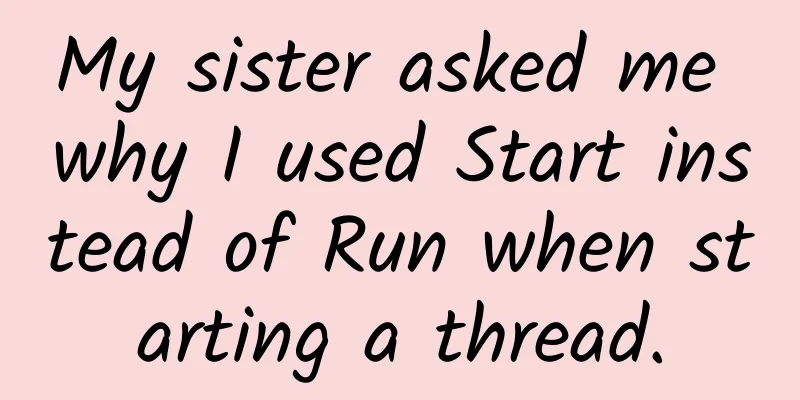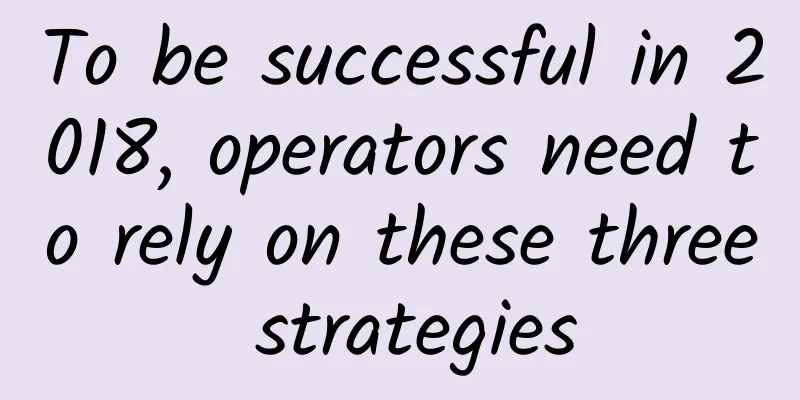My sister asked me why I used Start instead of Run when starting a thread.

|
This article is reprinted from the WeChat public account "Java Geek Technology", the author is a fan of Yaxue. Please contact the Java Geek Technology public account to reprint this article. Today, a girl in the team asked me why we use the start method instead of the run method when starting a thread. Fortunately, Ah Fen has been studying all the time, otherwise I would have been really stumped by the girl's questions. In multithreading, if you want to start a thread, you must use the thread.start() method instead of the thread.run() method (What, you are not using the thread.start() method? Be good, you are opening it wrong, don't do it next time Do you have any doubts, why do we always call the start() method, why not just call the run() method to start the thread? And if you look at the source code, you will find that in the thread.start() method, the thread.run() method is actually called to execute
The above comment translates: When a thread starts executing, the JVM calls the run method of this thread That is to say, the run method of the thread is called directly by the JVM. In Java, if we want to call the run method directly, it is also possible because the run method is public in Java.
Since the start method finally calls the run method, and the run method itself supports direct calling, why do we usually call the start method instead of the run method in the programs we write? That's because if you call the run method directly, it's not multithreaded. To facilitate explanation, let's look at a small demo:
The above program runs as follows: You will find that the run method of runThread is executed twice Once the run method runs in its own thread, you can see from Run begin another, current thread: Thread-0 that this thread is running in Thread-0 Another time is because our program code directly calls the run method. At this time, the thread runs in the main thread, which can be seen from Run begin another, current thread: main That is to say, if we call the run method directly, the thread does not run in its own thread, but in the current thread. Why do we create multiple threads? Isn't it because we want multiple threads to execute in parallel? For example, I am now thread A, and another thread is started. Then I hope that this thread will run with thread A. If the run method is called directly, it will run in thread A. The goal of creating multiple threads is not achieved, how can this be done, right? So when starting a thread, use the start method instead of the run method. This is actually also explained in the source code: the Java Virtual Machine calls the run method of this thread. The result is that two threads are running concurrently: the current thread (which returns from the call to the start method) and the other thread (which executes its run method). After the JVM calls the thread's run method, the result is that two threads are running simultaneously:
Can a thread be started twice? The girl understood why threads generally use the start method instead of the run method, because calling it would violate our original intention of using multi-threading The girl asked Ah Fan again, can a thread be started twice? The responsible fan quickly told the little sister that it was not allowed If a thread is started twice, it will throw an IllegalThreadStateException. We can also see this error in the source code:
When a thread starts, it first checks whether the value of threadStatus is 0. If the value is not 0, it means that the state of the thread is not new, and an IllegalThreadStateException is thrown. Ah? I actually want to ask Ah Fen, what other states are there in a thread besides new? Ah Fen wrote an article before, would you like to take a look: The interviewer didn't expect that I could talk about the life cycle of a Java thread for half an hour |
<<: My girlfriend suddenly asked me what DNS is...
>>: To promote user migration to 5G, these tasks need to be done in advance
Recommend
How to protect remote workers from cyber attacks?
[[400945]] During the coronavirus outbreak around...
Four waves, closing the TCP connection
[[428968]] This article is reprinted from the WeC...
New product pre-sale | Aruba Instant On MU-MIMO dual-band Gigabit Mesh wireless AP series products starting at 606 yuan
Today I would like to introduce to you Aruba laun...
Number One "Thousand Faces" - What you see may not be me
[[423706]] Do you have such troubles? It's in...
Neusoft Yang Jiwen: Cybersecurity companies need to improve their comprehensive capabilities to develop
The 2017 Internet Security Conference with the th...
NWCU's Smart New Campus 2.0, layout of "IT unified smart operation and maintenance" (Part 2): operation and maintenance organization management and process management
Xi’an University of Architecture and Technology i...
Wi-Fi 6 deployment exceeds 5G, will Wi-Fi 6 become the next generation of wireless network?
In addition to popular devices such as smartphone...
Did you know there are 4 types of network latency?
Speaking of latency, most of us are familiar with...
LOCVPS launches 1Gbps port VPS in Hong Kong, 20% discount, monthly payment starts from 36 yuan
LOCVPS launched a 1Gbps port Hong Kong VPS host b...
RackNerd: Cheap VPS hosting starting from $10/year, self-service IP change, multiple data centers in San Jose/Los Angeles/Seattle/New York, etc.
RackNerd should be one of the merchants that curr...
How will the two major operators' competition to upgrade IPv6 affect me?
On May 21, at the 2018 Global Next Generation Int...
With these four tips, not only the guy next door, but even God can’t get access to your WiFi!
The world is so big, thank you for visiting me!! ...
ZJI Golden Autumn Brings Coolness: 40% off on Hong Kong Kwai Wan High Defense Servers, 32% off on designated models in Hong Kong Tai Po
ZJI has launched the second wave of its September...
Maxthon Hosting 20% off CN2 Collection: Korea CN2/Hong Kong CN2/Germany CN2/Netherlands CN2/US San Jose CN2
Everyone is familiar with Maxthon Hosting. It was...
Is it a major setback or a cold shower? What happened to 5G?
Because South Korea postponed the commercializati...





![[11.11] ZJI: Hong Kong Kwai Bay Server 50% off 500 yuan/month-2*E5-2630L/32G memory/1TB SSD/20M bandwidth](/upload/images/67cabd4c87428.webp)



